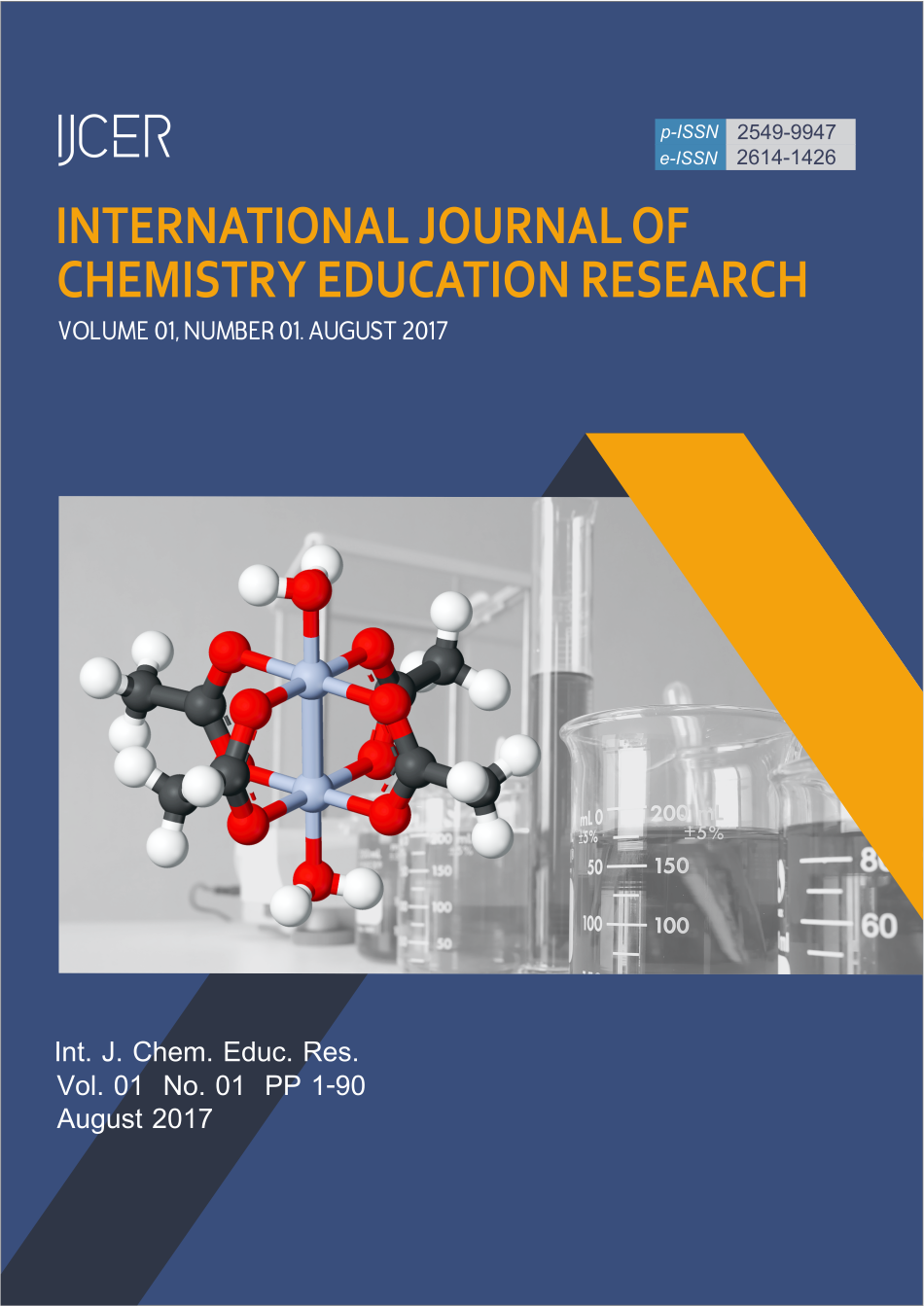Main Article Content
Abstract
ABSTRACT: The development of inquiry learning has been performed on Chemistry Analytic II Practicum at Chemistry Analyst Department. This study is a classroom action research using 68 students of semester 2nd. Inquiry learning development that has been implemented in general has given the results of innovation learning in vocational education programs. Development of learning innovation is particularly relevant to the competency certification systems that have been developed in Professional Certification Agency (LSP UII). The lesson plan has been done contributed to improvements in the design of learning that refers to the Indonesian National Competency Standards in 2015.
The development of inquiry learning can help the achievement of student competence. Achievement of competence from the knowledge aspect is done by using written test response test data, while from the attitude and skill aspect is measured from test practice test value. Mean of achievement of knowledge competence is 57.34 and mean of attainment of competency from attitude and skill aspect is 72.06. Competence is an assessment of knowledge, attitudes and skills that can be measured. Chemical Practicum Learning Analysis II is a process of inquiry learning conducted through a series of experiments so that the learning process should be supported by the understanding of the theory concepts that get in the classroom. Practicum learning is focused on achieving the competence of work attitude which gives birth to a standardized work culture and skills must be supported with sufficient knowledge.
Data supporting the achievement of student competence can be measured through self assessment in three competency units, that is MSL973002A prepare work solution, MSL974001A prepare, standardize, and use solution and MSL974003A perform testing and chemical procedure that is in accordance with this course with SKKNI Field Laboratory Testing Services from Australian Laboratory Operations Training Package (MSL09). Assessment is done after the students follow the learning process inquiry with the development of learning video. Achievement of students' average student competency Semester 2nd of Chemical Analyst Department at three units of competence is 78.52%. During the learning process practicum, students are given learning tasks in preparing work solutions including preparing, standardizing and using the solution. Achievement rates on these units were 77.30% and 79.51%.
The result of the learning development that has been done can give the improvement of the learning result according to the expected target. Learning outcomes can be obtained grades A was 70.74%. Assessment of students in learning practicum is an accumulation of the value of knowledge of pre-test and test responses of writing, the value of skills and attitudes of practicum activities, preparation of reports, seminars and practice test exams. Based on the results of the study showed that inquiry learning can help the achievement of learning outcomes.
Keywords: inquiry, competency, video tutorials, learning outcomes
Received: 21 June 2017, Revised: 13 August 2017, Accepted: 1 September 2017
Article Details
Author retain copyright and grant the journal right of first publication with the simultaneously licenced under A Creative Commons Attribution (CC-By-SA) 4.0 License that allows others to share the work with an acknowledgment of the worsk's authorship and initial publication in this journal.
References
- E. Mulyatiningsih, Pembelajaran Aktif, Kreatif, Inovatif, Efektif dan Menyenangkan (PAIKEM),(Direktorat Jenderal Peningkatan Mutu Pendidik dan Tenaga Kependidikan, Jakarta, 2010).
- B. Amelia, A.T. Widodo, JIPK, 9, 1, 1496-1505(2015).
- I.T. Aprilia, M. Nuswowati, and E. Susilaningsih, JIPK, 9, 2, 1607-1616(2015).
- B. Fachera, D. Somantri, and D.L. Hakim, Invotec,8, 2, 115-126(2013).
- Erniwati, R. Eso, and S. Rahmia, JSPF, 10, 3, 269-273(2014).
- Daryanto, Media Pembelajaran (Gava Media, Yogyakarta, 2010).
- Sugiyono, Metode Penelitian Pendidikan Pendekatan Kuantitatif, kualitatif dan R & D (Penerbit
- Alfabeta, Bandung 2008).
- Arikunto, Dasar-dasar Evaluasi Pendidikan (Bumi Aksara, Jakarta, 2008).
- E. Kazempour, 2013, J.Soc Issues& Human, 1 , 3, 23-27(2013).
- Roestiyah, Strategi Belajar Mengajar, 7th ed (Rineka Cipta, Jakarta, 2008).
References
E. Mulyatiningsih, Pembelajaran Aktif, Kreatif, Inovatif, Efektif dan Menyenangkan (PAIKEM),(Direktorat Jenderal Peningkatan Mutu Pendidik dan Tenaga Kependidikan, Jakarta, 2010).
B. Amelia, A.T. Widodo, JIPK, 9, 1, 1496-1505(2015).
I.T. Aprilia, M. Nuswowati, and E. Susilaningsih, JIPK, 9, 2, 1607-1616(2015).
B. Fachera, D. Somantri, and D.L. Hakim, Invotec,8, 2, 115-126(2013).
Erniwati, R. Eso, and S. Rahmia, JSPF, 10, 3, 269-273(2014).
Daryanto, Media Pembelajaran (Gava Media, Yogyakarta, 2010).
Sugiyono, Metode Penelitian Pendidikan Pendekatan Kuantitatif, kualitatif dan R & D (Penerbit
Alfabeta, Bandung 2008).
Arikunto, Dasar-dasar Evaluasi Pendidikan (Bumi Aksara, Jakarta, 2008).
E. Kazempour, 2013, J.Soc Issues& Human, 1 , 3, 23-27(2013).
Roestiyah, Strategi Belajar Mengajar, 7th ed (Rineka Cipta, Jakarta, 2008).




